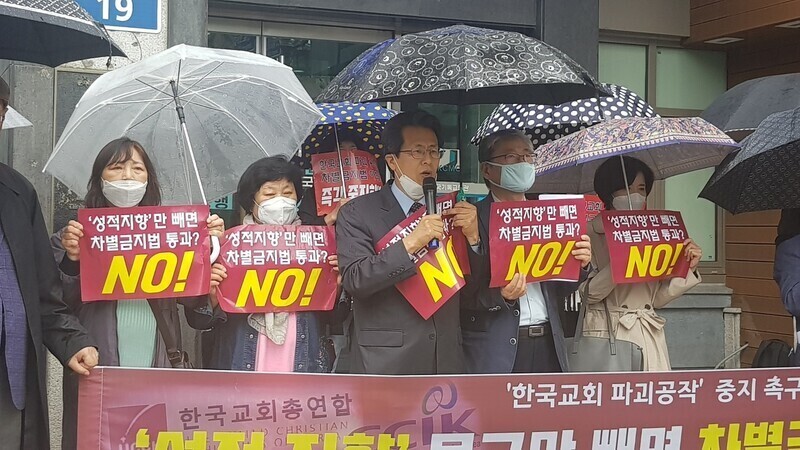hankyoreh
Links to other country sites 다른 나라 사이트 링크
How LGBTQ community became S. Korean conservative Christians’ archenemy

As inter-Korean relations remain chilly despite the summer heat, a pair of events are being held to diagnose changes in South Korea’s conservative Christian movement, which has been a major force sustaining Cold War tensions, and to prescribe solutions for that.
The National Council of Churches in Korea (NCCK) will be holding an academic symposium on the topic of “The Cold War and the Korean Church” at 3-6 pm on Tuesday to mark the 68th anniversary of the armistice that ended the Korean War. The symposium is being organized by the NCCK’s Special Committee for 100th Anniversary Projects.
An NGO called Peace and Theology will be holding a forum titled “Divided Hearts and the Korean Church” at 7:30 pm on the same day.
Because of COVID-19, both events will be held on Zoom, the online video conferencing platform, and streamed live on YouTube.
Suh Myung-sahm, a professor at Ewha Womans University, is one of the scholars presenting at the symposium on “The Cold War and the Korean Church.”
“In the mid-2010s, Korean right-wing Protestants toned down their political messages based on the old Cold War paradigm. Instead, they’ve begun to focus their interest on the culture war under slogans against homosexuality and Islam,” Suh wrote in his presentation.
“When the American embassy first officially expressed support for Korea’s Queer Culture Festival and began to participate in the festival alongside the French and German embassies and US-based companies like Google in 2014, it created a kind of cognitive dissonance for Korean right-wing Protestants. While Korea’s conservative evangelicals still want to preserve the South Korea-US alliance, they’ve shifted toward opposing liberal America, which is one of the main defenders of gay rights.”
“Christians in Korea have functioned as reliable supporters of a particular ideology that is “anti-Communist, pro-American, and pro-capital” and of administrations grounded in that ideology,” wrote Bae Deok-man, a researcher at the Nehemiah Christian Institute, in a paper prepared for the symposium.
“But since the beginning of the 21st century, those Christians have become militant participants in the culture war while instigating hatred and exclusion against LGBT people, refugees, and Muslims.”
“One important motivating factor is the sharp increase of a sense of existential crisis among Christians as their influence has diminished and social criticism of Protestants has heightened since 2001 because of a string of scandals in megachurches such as Gwangnim Church, Samil Church, Sarang Church, and Myeongseong Church; the sudden appearance and aggressive proselytism of cults such as Shincheonji and the World Mission Society Church of God, and the rapid rise of ‘unchurched’ Christians who don’t attend services,” Bae wrote.
Kim Sung-kyung, a professor at the University of North Korean Studies, will be presenting at the “Divided Hearts and the Korean Church” forum, which is being held by Peace and Theology, the NGO. Kim argues that “not only structural changes but also a psychology of the heart that can bring about changes in the heart, is needed to move beyond the Cold War.”
In his prepared speech, Lee Sang-cheol, director of the Christian Academy, observed that the church “has covered up and failed to address problems faced by victims, minorities, and ‘the other’ while emphasizing Christianity, vicarious atonement, and reconciliation.”
“We need to move away from our tendency to hurriedly wrap one thing up and rush on to the next thing. The trauma caused by the Korean War didn’t end with memories of the past; it continues in the present.”
By Cho Hyun, staff reporter
Please direct comments or questions to [english@hani.co.kr]

Editorial・opinion
![[Column] Has Korea, too, crossed the Rubicon on China? [Column] Has Korea, too, crossed the Rubicon on China?](https://flexible.img.hani.co.kr/flexible/normal/500/300/imgdb/original/2024/0419/9317135153409185.jpg) [Column] Has Korea, too, crossed the Rubicon on China?
[Column] Has Korea, too, crossed the Rubicon on China?![[Correspondent’s column] In Japan’s alliance with US, echoes of its past alliances with UK [Correspondent’s column] In Japan’s alliance with US, echoes of its past alliances with UK](https://flexible.img.hani.co.kr/flexible/normal/500/300/imgdb/original/2024/0419/2317135166563519.jpg) [Correspondent’s column] In Japan’s alliance with US, echoes of its past alliances with UK
[Correspondent’s column] In Japan’s alliance with US, echoes of its past alliances with UK- [Editorial] Does Yoon think the Korean public is wrong?
- [Editorial] As it bolsters its alliance with US, Japan must be accountable for past
- [Guest essay] Amending the Constitution is Yoon’s key to leaving office in public’s good graces
- [Editorial] 10 years on, lessons of Sewol tragedy must never be forgotten
- [Column] A death blow to Korea’s prosecutor politics
- [Correspondent’s column] The US and the end of Japanese pacifism
- [Guest essay] How Korea turned its trainee doctors into monsters
- [Guest essay] As someone who helped forge Seoul-Moscow ties, their status today troubles me
Most viewed articles
- 1[Column] The clock is ticking for Korea’s first lady
- 2Samsung barricades office as unionized workers strike for better conditions
- 3After 2 months of delayed, denied medical care, Koreans worry worst may be yet to come
- 4[Correspondent’s column] In Japan’s alliance with US, echoes of its past alliances with UK
- 5[Column] Has Korea, too, crossed the Rubicon on China?
- 6Hong Se-hwa, voice for tolerance whose memoir of exile touched a chord, dies at 76
- 7[Photo] Smile ambassador, you’re on camera
- 8All eyes on Xiaomi after it pulls off EV that Apple couldn’t
- 9[Guest essay] How Korea turned its trainee doctors into monsters
- 10US overtakes China as Korea’s top export market, prompting trade sanction jitters